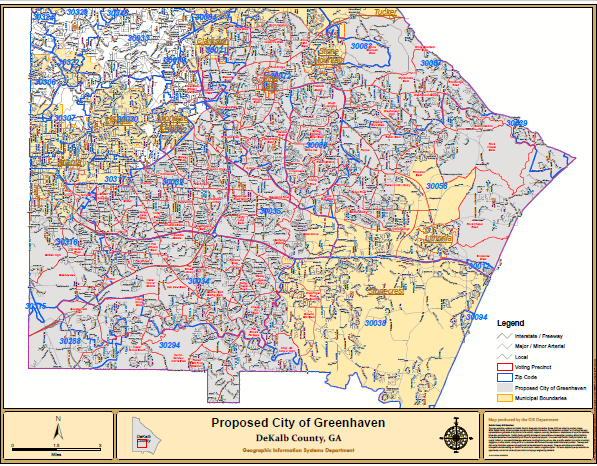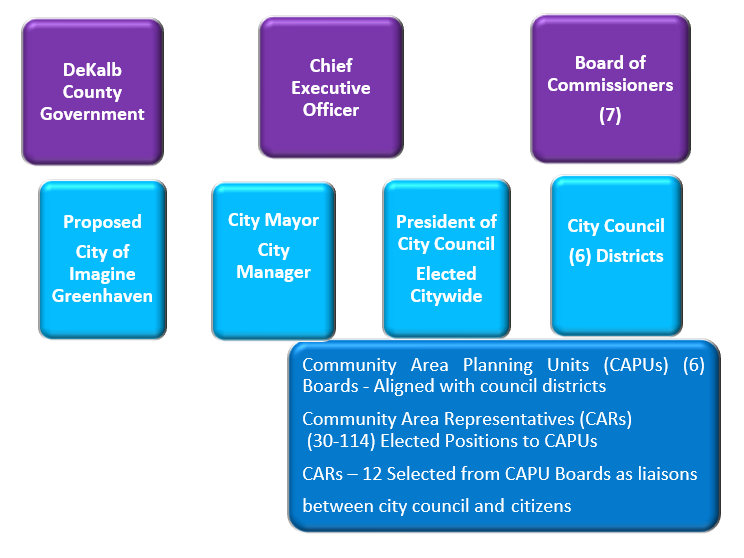Financial Implications

Quote directly from proponents’ Frequently Asked Questions document: “Proposed Greenhaven’s primary weakness – its economic vulnerability”…Even proponents admit that the greatest risk for the proposed city is that the economics do not work. Yet, they press on for the approval of Greenhaven legislation.
Unlike most newly created cities in DeKalb County, unincorporated South DeKalb County, the proposed Greenhaven has no strong commercial base, nor will it ensure that residential property owners would not bear the primary burden of increased taxes and fees.
- Lack of a strong commercial base places the primary tax burden on residential property owners.
- 95% of land parcels are residential; generates 78% of revenues
- 3% of land parcels are commercial and industrial; generates 22% of revenues
- Legislation has no initial millage rate defined
- Proposed city council allowed to increase millage by 1.5 mils, after initial rate is approved
Size and Boundaries

Advocates for City of Greenhaven publicly stated that the feasibility study could not meet the fiscal viability requirement without increasing the number of residential properties. This would create the second largest city in Georgia and the largest city in DeKalb County with a population of 300,000 residents and boundaries of 126 square miles.
Limited Core Delivery Services 
The Feasibility Study states that it could not find another comparable city in the United States the size and with the limited services proposed Greenhaven. The proposed City of Greenhaven offers three (3) core municipal services.
- Planning and Zoning
- Code Enforcement
- Parks and Recreation
- It will Not provide any public safety services of:
- Police
- Fire
- EMS
- Will not provide any of the other 43 services you now receive from DeKalb County Government
- You will still pay DeKalb County Government or other contract vendors to delivery services beyond the three proposed services.
Proposed Government Structure
Residents of unincorporated DeKalb County would be required to navigate through four additional layers of government. Citizens will continue to receive the majority of services through DeKalb County Government, requiring citizen interactions.
Unlike the City of Atlanta Neighborhood Planning Units (NPUs) that are comprised of citizen volunteers, cityhood legislation codifies Community Area Planning Units (CAPU) as elected positions and creates the potential for an additional 30 – 114 elected positions.
- Qualifications, compensation, or term of office are not specified for mayor
- Codifies CAPUs members as elected officials aligned with six city council districts
- Board members are elected
- Six district CAPUs create a board that is liaison between citizens and city council, creating added layers of bureaucracy
- Authorizes a CAPU treasurer to accept and track funds for the CAPU
- Decentralizes financial handling from the administration
- Provides no transparency as to where or from whom funds may be accepted
- Membership size ranges from 5 -19 (based on previous bills presented) with no criteria for the variance in membership size when each CAPU represents the same district size of 50K residents. (2019 proposed bill does not include these numbers)
- Authority to set salaries for city council in lieu of council members
- Assist in the selection of ethics board members which has nothing to do with the stated responsibilities

Click here to download the above chart
Economic Development Plan

While wholesome and high quality economic development and job creation are lofty goals that we all desire, three core service delivery functions, identified for the city of Greenhaven, are not the attributes to achieve stated objectives.
These attributes are not present nor available for the proposed city of Greenhaven in its infancy and would require a tremendous financial burden on the current residents, residential property, and business owners of unincorporated DeKalb County.
The proponents’ Economic Development Plan is a four-page document. It is a concept document lacking data and specifics for a viable economic development plan.
- Data used is outdated and may no longer be valid
- Globally recognized and competitive infrastructure – utilities, transportation inclusive of accessible public transit facilities, fiber optics with nearby assemblage of land available for development
- Revenue incentives, tax abatements, long term municipal bond capacity, financing tools, etc.
- A globally recognized marketing resource
- Plan relies heavily on the assumption of MARTA rail down the I-20 East corridor to attract businesses
- Lack of fundamental details to produce a valid and workable economic development plan
- Does not include an assessment of current environment as a baseline on which to build economic development
- Does not identify targeted businesses or industries
- Does not provide strategies to accomplish economic development
- Does not provide data to support any of its assumptions
- Does not include strategies for integration of its three core municipal services
Need other reasons to defeat proposed City of Greenhaven?
Click the links below to hear what cityhood proponents had to say about their economic development plan. You will be amazed at the non-responsive answers to questions. Source: Neighbors Against Greenhaven (NAG), November 8, 2018 at the PRISM community meeting in Stone Mountain
Where is the money coming from and Economic Development Question